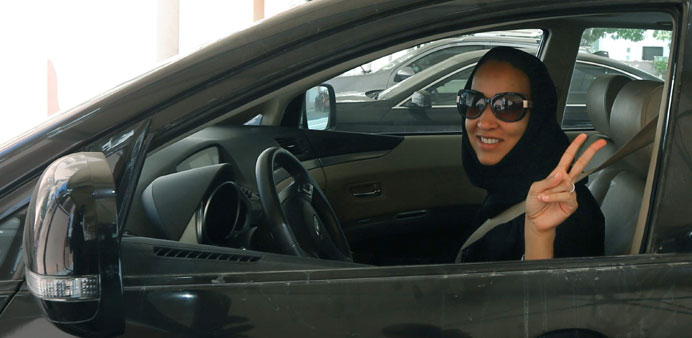Saudi activist Manal al-Sharif flashes the victory sign as she drives her car on Tuesday in Dubai, where she now lives.
Agencies/Dubai
Saudi Arabia’s government sought to snuff out a campaign to end a ban on women driving, warning yesterday it would use force to stop any protest aimed at overturning the ban.
Saudi women’s rights activists posted online photographs and video clips of themselves defying the ban this month after some members of the Shura Council, an influential body that advises the government, called for an end to the prohibition.
Debate about the ban, once confined to the private sphere and social media, is spreading to public forums too.
The Saudi interior ministry said calls on social media for “banned gatherings and marches” to encourage women to drive were illegal.
“The interior ministry confirms to all that the concerned authorities will enforce the law against all the violators with firmness and force,” the ministry said in a statement carried by state news agency SPA.
There is no specific law that prevents women from driving in the kingdom but they cannot apply for driving licences and some have been arrested on charges relating to public order or political protest after getting behind the wheel.
The “October 26 Driving” campaign has asked Saudis to put its logo on their cars and called upon women with international driving licences to get behind the wheel that day, while urging other women to learn to drive.
Supporters of the ban, including members of Saudi Arabia’s clerical establishment, have said allowing women to drive will encourage the sexes to mix freely in public and thus threaten public morality.
On Tuesday, Saudi news website www.sabq.org said that 200 clerics and preachers had visited the royal court in Jeddah to make a case against women driving.
“We came to the guardian (King Abdullah) to clarify the seriousness of this period,” Sabq quoted Sheikh Nasser bin Salman al-Omar, secretary general of the League of Muslim Scholars, as saying.
“If those behind the conspiracy of women driving approach the house from the back, the sheikhs wanted to come through the front doors,” he added.
Since its launch on September 20, the campaign against the ban has drawn online support from more than 20,000 citizens, according to the organisers.
“October 26 is a day on which women in Saudi Arabia will say they are serious about driving and that this matter must be resolved,” said Manal al-Sharif, who was arrested and held for nine days in May 2011 for posting online a video of herself behind the wheel.
In a protest she led the following month, a number of women were stopped by police and forced to sign a pledge not to drive again.
The 34-year-old computer engineer who now lives in Dubai said women have already begun responding to the call, and “more than 50 videos showing women currently driving” have been posted online during the past two weeks.
With the exception of two women who were briefly stopped by police, authorities have so far not intervened to halt any of the female motorists.
This, combined with what seems to be more social acceptance of the new phenomenon, is encouraging more women to get behind the wheel along major roads across the kingdom.
A video posted on social networks this month shows a fully veiled woman driving in Riyadh as male motorists and families give her the “thumbs up” in support.
“There will be a November 26, December 26, a January 26, until authorities issue the first driving permit to a Saudi woman,” said Sharif.
In 1990, 47 women were arrested and punished after demonstrating in cars. The minister of interior subsequently banned women from driving but no law was ever promulgated.
This time, “there will be no demonstrations or rallying points”, activist Aziza al-Youssef said.

